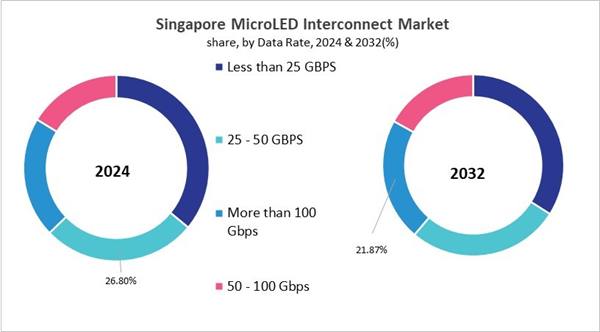The China market dominated the Asia Pacific MicroLED Interconnect Market by country in 2024 and is expected to continue to be a dominant market till 2032; thereby, achieving a market value of $50.7 Million by 2032. The Japan market is registering a CAGR of 18.5% during 2025-2032. Additionally, the India market is expected to showcase a CAGR of 20.4% during 2025-2032.
The Asia Pacific region is a world leader of the MicroLED interconnect technology, due to robust manufacturing infrastructure, high consumer demand, and publicly funded R&D. Nations like Japan, South Korea, China, Singapore, and Taiwan play important role across domains like end-to-end chain, from making panels to designing interconnects to putting the whole system together. Asia Pacific is the leader in both innovation and mass production when it comes to consumer electronics, AR/VR, and automotive displays. Fan-out wafer-level packaging (FOWLP), through-silicon vias (TSVs), and the use of high-speed protocols like HDMI 2.1, MIPI D-PHY, and DisplayPort 2.1 are all becoming more popular. At the same time, Japan and South Korea are looking into optical interconnects for immersive systems.
Prominent players like LG, Samsung, BOE, AUO, and Sony, in alliance with semiconductor giants such as ASE, TSMC, and JCET, are modernizing customize, high- performance interconnects. The region is rising up mass manufacturing, promoting home grown packaging, and making strategic worldwide collaboration. Some of the projects are building 2.5D and 3D packaging facilities, using AI to improve alignment, and making low-dielectric materials to reduce signal loss.
Country Outlook
MicroLED interconnect market in China is rising swiftly due to strong support from government, proficiency in manufacturing of display, and increasing homegrown semiconductors production. Furthermore, national and provincial programs are facilitating interconnect bonding, epitaxy, and mass transfer which will support the rising of cars, consumer electronics and AI systems. As per the State Council of the Peoples Republic of China, from January to September 2024, China's auto production totalled about 21.47 million units, up 1.9% year on year. Auto sales stood at 21.57 million units, an increase of 2.4% from the same period last year. This steady growth shows that there is strong demand for cars in the US and that companies are still investing in making new cars and improving existing ones, especially electric and smart cars. The growth path isn't just for traditional combustion engine vehicles; it also includes next-generation automotive technologies like self-driving cars and display systems inside cars.Japan’s proficiency in the precision engineering, its robust display production, and rich past of manufacturing semiconductor are some reasons behind the growth of the country’s MicroLED interconnect market. Furthermore, the growth of the market in Japan is closely tied to the strength of the semiconductor equipment market in Japan. MicroLED technology needs very precise fabrication and bonding processes. As per the Invest Tiwan, Japan exports most of the semiconductor equipment it manufactures. In 2022 alone, Japan had US$8.35 billion in domestic demand for equipment, accounting for 7.8% of the globally. Japan is strategically important because it is not only a major supplier of advanced semiconductor tools around the world, but it also has a growing demand for cutting-edge fabrication technologies within its own borders. More money is being put into semiconductor infrastructure and equipment in the US, which is a sign of a bigger push toward making more advanced electronics, such as new display technologies.
List of Key Companies Profiled
- Samsung Electronics Co., Ltd. (Samsung Group)
- Apple, Inc.
- Sony Corporation
- LG Electronics, Inc. (LG Corporation)
- AU Optronics Corporation
- BOE Technology Group Co., Ltd.
- AvicenaTech, Corp.
- Aledia
- Ayar Labs, Inc.
- EPISTAR Corporation
Market Report Segmentation
By Product Type
- Chip-to-Chip
- GPU-to-GPU
- GPU-to-Memory
By Data Rate
- Less than 25 GBPS
- 25 - 50 GBPS
- More than 100 Gbps
- 50 - 100 Gbps
By Distance
- Less than 1 meter
- 1 - 5 meter
- More than 5 meter
By Country
- China
- Japan
- India
- South Korea
- Singapore
- Malaysia
- Rest of Asia Pacific
Table of Contents
Companies Mentioned
- Samsung Electronics Co., Ltd. (Samsung Group)
- Apple, Inc.
- Sony Corporation
- LG Electronics, Inc. (LG Corporation)
- AU Optronics Corporation
- BOE Technology Group Co., Ltd.
- AvicenaTech, Corp.
- Aledia
- Ayar Labs, Inc.
- EPISTAR Corporation









